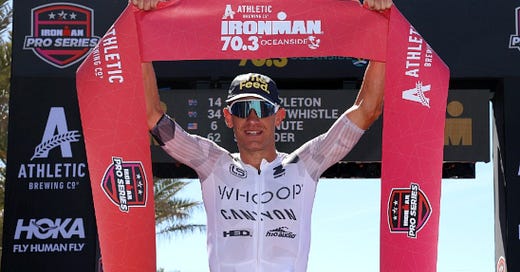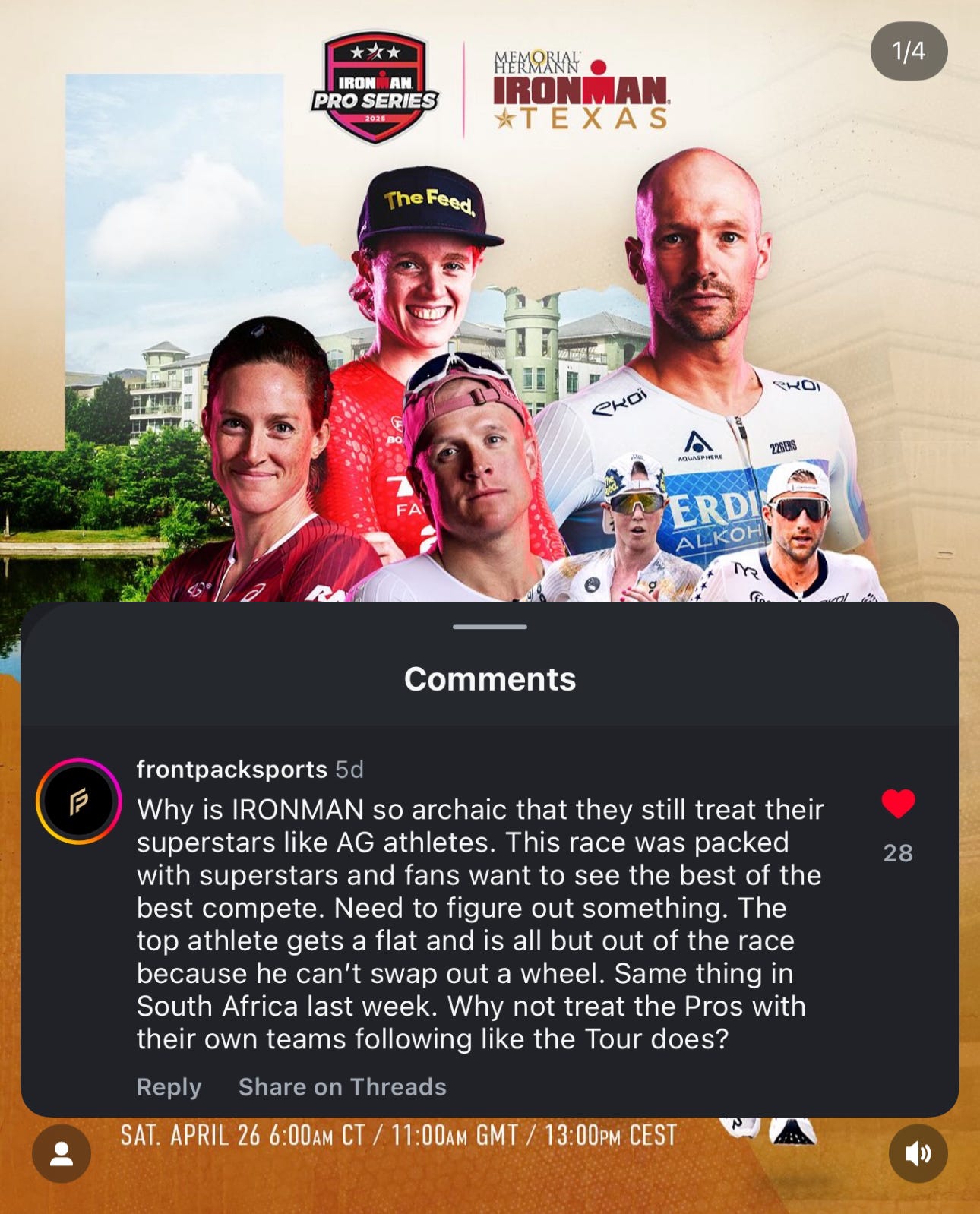Issue 66 - Does IRONMAN Care About their Pro Athletes?
The Pros we spoke with said more can be done
👋 Good morning and happy Friday. I’m Scott and feel free to reach me here.
This is the Front Pack Newsletter, your weekly source for all things endurance and business. We feed you the most important things happening in the world of health & wellness, cycling, triathlon, and running.
Join our app to stay motivated, meet athletes near you, coordinate workouts, and highlight your journey to greatness.
As always. Stay moving…✌️
SB
*Note - The following, while critical of IRONMAN is meant to be an open discussion about the state of the sport with regard to the pro elite triathlete. While some may take offense to our opinion, we all only want to see the sport survive and thrive.
Happy Racing?
Let’s ask a question that most people in triathlon are too polite and the pros are too scared to say out loud, “How committed is IRONMAN to professional triathlon?”
Like, really committed? Not in press releases or carefully worded Instagram captions, but in actual practice?
Or has the PTO simply forced their hand to “care”.
According to some pro triathletes we spoke with on condition of anonymity, more can and should be done to ensure the best product is put out at every race.
Because while the Age Group engine keeps the $1 billion IRONMAN business and brand humming (and we love our AGers, let’s be clear), the identity of triathlon—the drama, the broadcast, the greatness of the sport—is driven by its pros that fans get to watch live. And yet... there’s a huge disconnect.
The IRONMAN Pro Series
Yes, the IRONMAN Pro Series has been a step in the right direction. It offers real prize money, ranking points, and a narrative fans can follow all season long. The first year was a solid start. But let’s not forget it was only a few short years ago that it did not even exist until the PTO showed up and forced IRONMAN’s hand.
Context: The PTO with its deep pockets gave birth to bigger prize purses and paying pros like pros; treating them like the stars they are. They quickly signed lots of contracts with Pros and gave IRONMAN a bit of a scare. Like a new, incredibly gorgeous person arriving to the small town, IRONMAN was no longer the best thing in town and fairly quickly, whether it was already in the making or not, IRONMAN realized it couldn’t ignore they had become complacent anymore and announced the Pro Series only a few weeks after the T100 was announced.
And so we got the Pro Series.
So what is all the fuss?
Last weekend, Kristian Blummenfelt flatted on the bike at the iconic 70.3 Oceanside and right there on live TV, he race was all but over. It’s unlikely he would have beaten Lionel Sanders but it would have been great to see what would have been and amazing race.
You see, KB is arguably the #1 triathlete on the planet, an Olympic gold medalist, IRONMAN World Champion, short-course, long-course, whatever-you-want king. He flats at Mile 12 during the bike leg at IRONMAN 70.3 Oceanside. In those 12 miles, he was carving up the field.
On Marc Dubrick’s Instagram chat on Wednesday, Justin Riele who won the bike portion with the fastest split even admitted that he was not going to be able to hang with KB. Dude was flying.
But he flats, and in today’s rules and world - yes, that is on him. The dudes on the ProTriNews podcast all said the same, “It is your responsibility.” And I agree.
But the very best in the sport should not have to wait FIFTEEN MINUTES for a new wheel.
Fifteen. Minutes.
Imagine Shohei Ohtani walking up to the plate with no bat, and the bat boy saying, “Sorry man, hang tight, I’ll run to the parking lot.”
Imagine Michael Jordan blowing out a sneaker and just... chilling on the sideline while someone eventually finds him a pair.
It would never happen.
Because in real pro sports, the infrastructure is built to support excellence.
In triathlon? The pros often have to fend for themselves—and IRONMAN still seems okay with that. Why not change the rules to support excellence?
It’s not just Kristian, either. How many races have we seen where pros have no neutral support. These athletes fly overseas, play their monkey role and do all the marketing, photo shoots, and videos.
IRONMAN loves to market the pros, but when it comes to serving them, building systems around their success, creating a stage that matches their talent, it still feels stuck in Pre Pro Series.
And listen, this isn’t about disrespecting Age Groupers.
Front Pack is an Age Group community.
We pay the entry fees. We buy the overpriced merch. We pack the hotel rooms and show up on race day. But you don’t grow the sport without heroes. Without stars. Without professional athletes who inspire the rest of us to get up at 5 a.m., lace up our shoes, and chase something impossible.
So here’s the challenge to IRONMAN
If you’re going to create a Pro Series—treat it like a Pro Series.
If you want to tell the world this is a legitimate sport—treat your top athletes like Shohei Ohtani and Michael Jordan.
We can’t keep calling triathlon a professional sport while treating its stars like Age Groupers with better FTPs.
And if you want triathlon to be more than a bucket list event—build an ecosystem where greatness can thrive.
Because if you do, Kristian shouldn’t be sitting on the side of the road.
And fans watching shouldn’t have to listen to a commentator say, “Well that’s just bad luck.” Bad luck is puking along the side of the road at the World Championships.
And the next generation of pros shouldn't be wondering if triathlon is a career—or just a really expensive hobby with prize money.
You want to be a billion-dollar business?
Then act like it.
So what’s the solution?
A simple one my small brain came up with in 25 minute - Give the Top 30 pros a dedicated IRONMAN support vehicle.
Each race. Every venue. Every course.
As the Top 10 men and women leave T1, have a car following with spare wheels, a mechanic, and someone who actually knows what the hell they’re doing. As the next 10 leave T1, do the same. And then the next 10, do the same. Make support real, not a question mark.
We’re not talking about VIP treatment. We’re talking about basic infrastructure to support performance at the highest level.
These are the athletes driving viewership, selling registrations, and creating headlines.
The least they deserve is a backup wheel when five figures and ranking points are on the line.
You don’t grow the sport without a spotlight. And you don’t get a spotlight unless you protect the people standing under it.
IRONMAN and Scott DeRue. It’s time to decide what kind of organization you want to be. Do you want to continue to be the NBA and NFL, or is the G-League and XFL more appealing; because the T100 is ready to take the throne if given the chance.
To be a billion-dollar sports property, you better start treating your pros like professionals; not like background extras in a 70.3 or 140.6-mile commercial.
Holy hell, we didn’t even talk about the commercials!
Race day is unpredictable. But this?
This shouldn't be.
What do you think? Let us know in the comments.






Interesting take. Appreciate the thought process behind it.
However, I’m definitely voting no on support vehicles. Part of racing is being prepared, and the bottom line is it’s irresponsible and reckless not to carry a flat kit, simply hoping you won’t get a flat (or not knowing how to change a flat.) That’s part of the responsibility involved with racing as an individual athlete.
It’s not a World Tour cycling event with completely different dynamics. It’s a triathlon and a solo sport. Take care of yourself, regardless of whether you’re an age grouper or a pro.